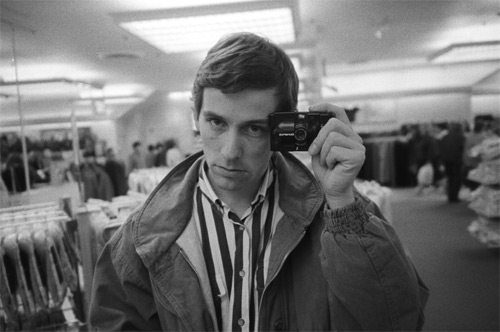|
|
|
|
|
|
|
|
|
|
|||
|
|
|
|
|
|
|
||||||
|
|
|
|
|
|
|
|
|
|
|
|
|
  Jasper in 1986, still two years from writing his first short story |
Jan: "In the beginning you mention an Ultraviolet having a table to himself... if the colors are based on R-Y-B mixture, how would one become ultraviolet and what would one see? Everything wee see and even more?" A UV would see violet in the natural world, and any Synthetic shades I should imagine. They're like Purples, just higher up the scale - sector Prefects, perhaps. Jan: "In the end, when you describe Eddie's Ishihara you mention him not seeing stuff but feeling them. Is that supposed to just show us that Ishiharas are something special or should I see that as a hint that Eddie is not just a plain old Red?" Oddly, the brain is quite often alert to stuff that is outside the bounds of concious awareness. There was an experiment done where a light was switched on and off and then dimmed until the subject was no longer aware of it. They were then asked whether they thought it was on or off. The answers suggested that they could still sense whether it was on, even without actually being concious of it. We don't really 'see' with our eyes, we see with our brain - or perhaps only interpret. Jan: "If Reds and Greens were to have a child, would that actually end up white, having all colors? No, it's just too icky to contemplate - a well established taboo. Jasper! What is a 'Retrousee' nose, and where might I have seen one? It's a nose that has a little hook right up at the tip Quite unusual, it is considered by some to be of great beauty and value, although those that have them can find them annoying, as even with your chin on your neck, one can still look as though you are looking down your nose at someone. I'm not sure why I included the whole 'nose subplot' in the book, but it seems that noses are something of a taboo subject. You might complement someone on their hair or their eyes, but never their noses. It's a great shame. A seriously good conk should be matter of some celebration, rather than derision. Famous people with Retrousee noses are Amy Adams, Darcy Bussell and Jenny Agutter. If anyone would like to add to my 'retrousee nose hall of fame', email me. Mrs Borade writes: Jasper, which do you think is more important, the language/style or the story? This is a question that to my mind belong more to the reader than the writer. Everyone has a preference over the sort of books they read, and many people enjoy flowery prose with no story, while others prefer all story and little or no language or style - it all depends on what you want from a book; Something to keep you on the edge of your seat and make airport waiting time vanish, or something that is a celebration of the English language that you can enjoy and savour like a fine historic building. Books, I believe, are impossible to compare like for like. One of the principles I work by is this: 'If it works, it works'. I think much of writing is that simple. Once you start putting pen to paper, ideas either work or they don't, and good prose, story, plotting, characterisation and atmosphere can be raised or lowered as the book requires. The most important thing is to not to be boring. But then again, different readers will have quite separate ideas of what is boring or not. And that's the thing about books. They are as varied and as wonderful in their huge range as humans themselves - and why not? They are a product of us, so we should see as much variation in the written page as we see in the street outside. Speaking personally, I generally like a good mix of the two, but find the lack of humour in some books wildly tedious. Irrespective of how bad life can be, there is always humour. Always. It's one of the things that makes us human, and there are many 'serious' books that completely ignore this issue - perhaps a case of the 'heart being all squeezed out by the mind'. Mrs Borade also writes: Are stories that are written with spontaneity better than ones that are written after a lot of deliberation? Again, this is a question that works either way. Some good books were written in six weeks and are excellent, while others that took ten years were frightful - and vice-versa. It depends upon the writer's preference, the time available and how the idea arrives. I've had books drop into my head fully-formed, and others had to be drawn out over many months. St-Exupery wrote 'The Little Prince' in four months, and 'To kill a mocking bird' took Lee two and a half years. Both books easily make the top six novels of the 20th century, but did either of them have a plan? I don't think we'll ever know. They were teased from the zeitgeist with eminently skilled fingers. There are no rules when it comes to writing. If it works, it works. I hope this helps, although I suspect it doesn't - writing, like any creative endeavour is a dark art, and so complex that it defies easily explanation. Jasper Fforde November 2009 |